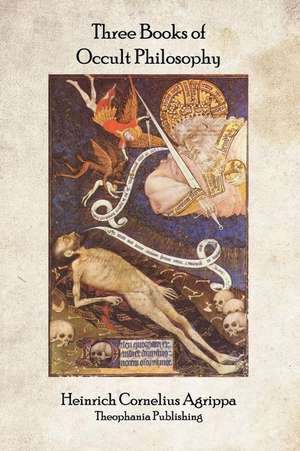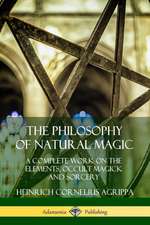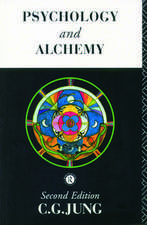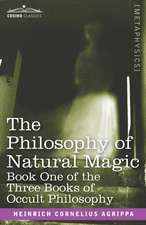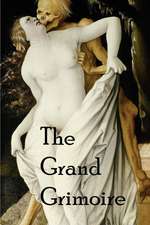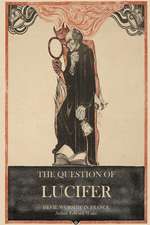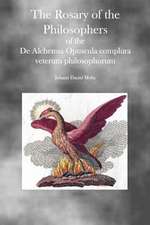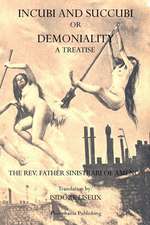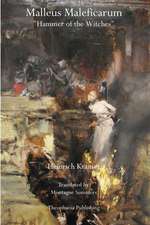Three Books of Occult Philosophy
Autor Heinrich Cornelius Agrippaen Limba Engleză Paperback
| Toate formatele și edițiile | Preț | Express |
|---|---|---|
| Paperback (1) | 251.16 lei 6-8 săpt. | |
| Theophania Publishing – | 251.16 lei 6-8 săpt. | |
| Hardback (1) | 914.79 lei 27-39 zile | |
| Inner Traditions/Bear & Company – 9 dec 2021 | 914.79 lei 27-39 zile |
Preț: 251.16 lei
Nou
48.06€ • 50.36$ • 39.73£
Carte tipărită la comandă
Livrare economică 12-26 aprilie
Specificații
ISBN-10: 1770830405
Pagini: 642
Dimensiuni: 152 x 229 x 33 mm
Greutate: 0.84 kg
Editura: Theophania Publishing
Notă biografică
HEINRICH CORNELIUS AGRIPPA von Nettesheim (1486-1535) was a German polymath, physician, legal scholar, soldier, theologian, and occult writer. Entering the University of Cologne at the age of 13, he graduated with a Master of Arts at 16 and went on to study with abbot Johannes Trithemius, famous as the teacher of Paracelsus. Acclaimed for his lectures on Reuchlin and the Corpus Hermeticum at universities across Europe, Agrippa acted as archivist for the Holy Roman Emperor Charles V. Defying accusations of heresy and scrutiny by the Inquisition of Cologne, he published the final version of Three Books of Occult Philosophy two years before his death. Agrippa is considered one of the most influential occultists of the early modern period. ERIC PURDUE has studied metaphysics and the occult and has practiced magic and astrology for more than thirty years, with a particular focus on practical folk and astrological magic. Through his lectures and writings on traditional astrology and talismanic magic, he has been a notable voice on the subjects of medieval astrology, traditional magical systems, and the legacy of Heinrich Cornelius Agrippa. His new translation of Three Books of Occult Philosophy was more than 10 years in the making.
Extras
Of the tables of the planets and their virtues and principles, and which divine names, intelligences, and daemons are placed in charge of them.
Additionally, magicians refer to certain tables of numbers assigned to the seven planets, which are called the sacred tables of the planets. They signify many and very great virtues of the heavens, inasmuch as they represent the divine reasoning of the celestial numbers, impressed upon the celestials by the Divine Mind through the reason of the World Soul, and the sweetest harmony of those celestial rays according to proportion of effigies, co-signifying the super-mundane intelligences, which can be expressed in no other way than by the marks of numbers and characters.
Indeed material numbers and figures cannot do anything in the mysteries in hidden things, unless represented by formal numbers and figures, inasmuch as they are ruled and formed by the divine intelligences and enumerations, which tie the extremes of matter and spirits to the will of the elevated soul through great affection by the celestial virtue of the operation: a power received from God through the Universal Soul, and the observations of the celestial constellations applying in matter appropriate for the form, the medium being disposed by magical skill and knowledge. But now we must hasten to explain each table.
The table of Saturn.
The first of these is assigned to Saturn, because it consists of a square of three, containing the particular numbers of nine and in any line three in every way and each diameter constitutes 15, but the total sum of numbers is 45. Divine names are assigned to these filling up names from the preceding numbers with an intelligence for the good and a daemon for the evil. From these same numbers are elicited a seal or character of Saturn and his spirit, such as we will write in his table below. They say that this table engraved in a lead plate with a fortunate Saturn, helps birth, men returning safely, and powerful and excellent success in petitions to princes and powerful [men]. However, if Saturn is made unfortunate, it hinders buildings, planting, and the like, overthrows men from honors and dignities, begets quarrels and discord, and disperses armies.
The table of Jupiter.
The second is called the table of Jupiter, which consists of four led into itself, containing 16 particular numbers and four in any line or diameter, constituting 34, but the entire sum is 136. Presiding over those are divine names with an intelligence for good, and a daemon for evil and a character and spirit of Jupiter is elicited from them. They say that if Jupiter is powerful and in rulership, and [these characters] are impressed on a silver plate, it brings gain and wealth, gratitude, love, peace, and concord with men, it appeases enemies, secures honors, dignities, and councils. It dissolves sorceries if engraved in coral.
The table of Mars.
The third table is for Mars, which is a square consisting of five, including 25 numbers, and from these are five in any side or diameter, which makes 65, and the entire sum is 325. Presiding over them are divine names with an intelligence for good and a daemon for evil, and a character and spirit of Mars are elicited from them. These are carved while Mars is fortunate in an iron plate or a sword making one powerful in war and judgments and petitions, and frightful to enemies, and is excellent for victory against enemies, but if carved in the stone cornelian, it draws blood and menstrua. However if Mars is unfortunate and carved in red copper plate, it hinders buildings, overthrows powerful men from dignities, honors, and wealth, it generates discord, quarrels, and hatred in men and beasts, chases away bees, pigeons, and fish, hinders mills, makes hunting and battles unfortunate, generates sterility in men, women, and other animals, and strikes fear in all enemies and compels them to exhibit respect.
The table of the Sun.
The fourth table is for the Sun consists of a square of six and contains 36 numbers, which has six in any side, and diameter producing 111, and the entire sum is 666. Presiding over them are divine names with an intelligence for good and a daemon for evil, and from them are elicited characters and spirits of the Sun. When the Sun is fortunate if carved in gold plate, it makes the wearer famous, amiable, pleasing, powerful in all works, makes men equal with kings and princes, elevates them to the highest peaks of fortune, and makes one acquire whatever they desire. But if the Sun is unfortunate, it makes one a tyrant, arrogant, ambitious, insatiable, and have an evil ending.
The table of Venus.
The fifth table is Venus, containing seven led into itself, that is, having 49 numbers, which are seven on all sides and diameters containing 175, and the entire sum is 1225. Presiding over them are divine names with an intelligence for good and a daemon for evil, and from them are elicited a character and spirits for Venus. When Venus is fortunate and carved in silver plate, it brings concord, interrupts quarrels, grants the love of women, brings conception, drives away sterility, brings power in coition, dissolves enchantments, generates peace among men and women, and makes whichever animal and cattle fertile and bear plentifully. If placed in a pigeon house, it increases pigeons. It opposes all sickness and melancholy, generates joy, and if worn by a traveler, it [makes them] fortunate. But if Venus is unfortunate and formed in copper, it makes everything opposite to what was previously said.
The table of Mercury.
The sixth table is Mercury, which results in eight led into itself, containing 64 numbers, of which there are eight in any direction, and in each diameter making 2080. Presiding over them are divine names with an intelligence for good and a daemon for evil and elicited from them are characters for Mercury and its spirits. If Mercury is made fortunate, carve in silver, tin, or yellow brass, or inscribed on virgin parchment, it makes the wearer pleasing, and fortunate for whatever they wish to obtain. It confers gain and chases away poverty. It confers memory, intellect, divination, and noticing occult things by dreams. If Mercury is unfortunate, it makes the opposite to all of the above.
The table of the Moon.
The seventh table is the Moon. It contains nine multiplied by itself, having 81 numbers, in which there are nine on any side and diameter, producing 369, and the entire sum is 3321. Presiding over them are divine names with an intelligence for good and a daemon for evil and elicited from them are characters of the Moon and its spirits. When the Moon is fortunate and carved in silver, it makes the wearer pleasing, amiable, delightful, eager, honorable, and wards away all wickedness and ill will. It excels in security in journeys, makes wealth and a healthy body, and drives away enemies and other harmful things from whatever place they wish. If the Moon is unfortunate and [carved] in lead, and buried in some place, it makes that place, its inhabitants, visitors, ships, springs, rivers, and mills unfortunate. It makes all men unfortunate, against whom it was duly made, making them flee from their land and country, and from the place of his home wherever [the image] is buried. It hinders physicians, orators, and men in whichever office it was made against. But the way these seals and characters are elicited from the stars, and the spirits, the acute investigator will easily be able to understand from verifying these tables.
Cuprins
Publisher’s Preface by Ehud C. Sperling
Foreword by Christopher Warnock
Acknowledgments
Translator’s Introduction
Three Books of Occult Philosophy
To the Reader
Letter from Agrippa to Trithemius
Letter of Response from Trithemius to Agrippa
Dedicatory letter to Count Hermann of Weid
Book One
The Natural World
1 How magicians collect virtues of the threefold world will be shown in these three books.
2 What magic is, what are its parts, and what is required of a professor of magic.
3 Of the four elements, their qualities, and their mixtures with each other.
4 Of the rationale of the threefold consideration of the elements.
5 Of the wonderful natures of fire and earth.
6 The wonderful natures of water, air, and wind.
7 Of the types of compounds, how they are according to the elements, and how the elements agree with each other, with the soul, the senses, and behavior.
8 How the elements are in the heavens, the stars, in daemons, in angels, and finally in God Himself.
9 Of the virtues of natural things most closely depending upon the elements.
10 Of the occult virtues of things.
11 How occult virtues are infused into kinds of things by ideas through the World Soul, the stellar rays, and which things are most abundant with this virtue.
12 How different virtues are infused into different individuals and species.
13 From where occult virtues of things proceed.
14 Of what the World Spirit is and how it binds occult virtues.
15 How we must investigate and test the virtues of things by way of acceptance and similarity.
16 How the operations of different virtues are transferred from one thing to another, and how they are shared with each other.
17 How the virtues of things are investigated and tested by hatred and friendship.
18 Of the inclinations of enmities.
19 How the virtues of things are investigated and tested, which things belong to the entire species, or what things are developed by being granted to particular individuals.
20 How natural virtues in some [things] are throughout their entire substance, but in other [things] in certain parts or members.
21 Of the virtues of things that belong to themselves only in their lifetime, and those [virtues] that remain in them even after death.
22 How inferior things are under celestial bodies, and how the human body, activities, and customs of man are assigned to the stars and signs.
23 How we shall know under which star natural things are and which things are Solar.
24 Of things that are under the Moon.
25 What is under Saturn.
26 That which is of Jupiter.
27 That which refers to Mars.
28 That which is of Venus.
29 Of what follows Mercury.
30 How the entire sublunary world, and that which is in it, is distributed among the planets.
31 How the planets are distributed among the provinces and kingdoms.
32 Of what is under the signs, the fixed stars, and their images.
33 Of the seals and characters of natural things.
34 How through natural things and their virtues, we can draw and attract influences and virtues of celestial bodies.
35 Of the mixtures of natural things with each other and their usefulness.
36 Of the union of mixed things and the introduction of more noble forms and the senses of life.
37 How with certain reliable natural and artificial preparations we may attract certain celestial and vital gifts from above.
38 How gifts are not only celestial and vital but are also received from certain intellectual and divine gifts from above.
39 That with certain reliable materials of the world we can draw the divine world and their divine ministering daemons.
40 Of what bindings are and how they are made.
41 Of sorceries and their power.
42 Of the wonderful virtues of certain sorceries.
43 Of fumigations, their reasoning, and power.
44 The composition of certain fumigations appropriate to the planets.
45 Of the virtues of collyries, ointments, and love potions.
46 Of natural alligations and suspensions.
47 Of rings and their composition.
48 Of the virtues of places, and the places corresponding to each of the stars.
49 Of lights and colors, lanterns, and lamps, and the colors distributed among the stars, houses, and elements.
50 Of bewitchings and their art.
51 Of certain observations producing wonderful virtues.
52 Of the face, gestures, habits, and figure of the body, to which stars these respond, and from where the arts of physiognomy, metoposcopy, and chiromancy have their foundations.
53 Of divination, auspices, and auguries.
54 Of some different animals and other things that have significations in auguries.
55 How auspices are verified through the light of the natural senses, and some rules for proving them.
56 Of soothsaying of lightning and flashes, and how to interpret portents and prodigies.
57 Of geomancy, hydromancy, aeromancy, and pyromancy; divinations of the four elements.
58 Of reviving the dead, sleeping, and fasting for a long time.
59 Of divination through dreams.
60 Of frenzy and divinations that happen when awake, of the power of the melancholy humor, which sometimes also allures daemons in the human body.
61 Of the forming of man, of the outer and inner senses, of the mind, of the threefold appetite of the soul, and the passion of will.
62 Of the passions of the mind, their origin, difference, and kinds.
63 How passions of the mind change one’s own body by exchanging accidents and moving the spirit.
64 How the passions of the mind change the body by the imitation of a likeness; also of the transformation and transference of man, and the strength of imaginative power held not only in the body but also in the soul.
65 How the passions of the mind also operate outside of themselves in another’s body.
66 That the passions of the mind are most helped by the proper timing of the celestials, and how the perseverance of mind is necessary in all works.
67 How the human mind can connect with the celestial mind andintelligences, and likewise with them impress certain wonderful virtues on inferior things.
68 How our mind can change and bind inferior things to that which is desired.
69 Of speech and the virtues of words.
70 Of the virtue of particular names.
71 Of complex speeches and songs, and the virtues and bindings of incantations.
72 Of the wonderful power of incantations.
73 Of the virtue of writings, and of making imprecations and inscriptions.
74 Of the proportion, correspondence, and reduction of letters to the celestial signs and planets according to various languages, with a table indicating this.
Book Two
The Celestial World
Dedicatory Letter to Count Hermann of Weid
1 Of the necessity of the discipline of mathematics and its many wonderful operations, which only the arts of mathematics can perform.
2 Of numbers, their power, and virtue.
3 That numbers possess such great virtues in natural things as well as transnatural things.
4 Of one and its scale.
5 Of two and its scale.
6 Of three and its scale.
7 Of four and its scale.
8 Of five and its scale.
9 Of six and its scale.
10 Of seven and its scale.
11 Of eight and its scale.
12 Of nine and its scale.
13 Of ten and its scale.
14 Of eleven and twelve, with a twofold scale of twelve, and the kabbalistic and Orphic.
15 Of numbers above twelve, their powers and virtues.
16 Of notable numbers placed in certain gestures.
17 Of various marks of numbers observed by the Romans.
18 Of the marks of the Greeks.
19 Of the marks of the Hebrews and Chaldeans, and certain other marks of magicians.
20 Which numbers are assigned to letters and of the divination of the same.
21 Which numbers are sacred to which gods and which are appointed to the elements.
22 Of the tables of the planets and their virtues and principles, and which divine names, intelligences, and daemons are placed in charge of them.
23 Of geometric figures and bodies, of what magical virtue they exert their influence, and which [figures] agree to each element and the heavens.
24 Of musical harmony, and its strength and power.
25 Of sound and harmonies, and from where their wonderfulness in operation comes.
26 Of the agreement of [sounds and harmonies] with the celestials, and how each harmony of sound responds to each star.
27 Of the proportion, measure, and harmony of the human body.
28 Of the composition and harmony of the human soul.
29 That the observation of the celestials is necessary in all magical operations.
30 When the planets are the most powerfully influential.
31 Of the observation of the fixed stars and their natures.
32 The Sun and Moon and their magical reasoning.
33 Of the twenty-eight mansions of the Moon and their virtues.
34 Of the true motion of the celestials to be observed in the eighth sphere, and the rationale of the planetary hours.
35 How artificial things, such as images, sigils, and the like, obtain some virtues from celestial bodies.
36 Of the images of the zodiac that accept virtues from the stars when engraved.
37 Of the images of the faces and their virtues, and of those images that are outside the zodiac.
38 Of the images of Saturn.
39 Of the images of Jupiter.
40 Of the images of Mars.
41 Of the images of the Sun.
42 Of the images of Venus.
43 Of the images of Mercury.
44 Of the images of the Moon.
45 Of the images of the Head and Tail of the Dragon of the Moon.
46 Of the images of the mansions of the Moon.
47 Of the images of the fixed Behenian stars.
48 Of the figures of geomancy, which are the medium between images and characters, and its table.
49 Of images whose figure is not like some celestial figure, but of that which the mind of the operator desires.
50 Of certain celestial observations and the practice of some of their images.
51 Of characters that are made after the pattern and imitation of the celestials, and how they are deduced from geomantic figures with a table of them.
52 Of characters that are derived from things themselves with a certain similarity.
53 How no divination without astrology is perfect.
54 Of lots and from when and where the virtues of their divinations are produced.
55 Of the World Soul and celestials according to the traditions of poets and philosophers.
56 The same is confirmed by reason.
57 That the World Soul and celestial souls are rational and share in the Divine Mind.
58 Of the names of the celestial souls and their lordship in this inferior world--namely man.
59 Of the seven governors of the world, the planets, and their various magical names devoted to speeches.
60 That human imprecations naturally imprint their powers in outer things, and how the human mind through each degree of dependencies ascends in the intelligible world and becomes like the more sublime spirits and intelligences.
Book Three
The Divine World
Dedicatory Letter to Count Hermann of Weid
1 Of the necessity, virtue, and usefulness of religion.
2 Of silence and concealing that which is secret in religion.
3 What dignification is required so that one can become a true magician and worker of wonders.
4 Of the two supports of ceremonial magic: religion and superstition.
5 Of the three guides of religion, which lead us to the path of truth.
6 How, with these guides, the human soul rises into the divine nature and is made a producer of miracles.
7 That knowledge of the true God is necessary for the magician, and what the ancient magicians and philosophers thought about God.
8 What the ancient philosophers thought about the divine Trinity.
9 What the true and most orthodox faith is about God and the most holy Trinity.
10 Of the divine emanations, which Hebrews call numerations, others call attributes, and gentiles call gods and deities, and of the ten Sephiroth and ten most sacred names of God presiding over them and the interpretation of them.
11 Of divine names, their power, and virtue.
12 Of the influence of divine names through each medium in these inferiors.
13 Of the members of God and of their influence in our members.
14 Of the gods of the gentiles, the souls of the celestial bodies, and which deities were once made sacred to [particular] places.
15 What our theologians think about the celestial souls.
16 Of intelligences and daemons, their threefold kinds, their various names, and of infernal and subterranean daemons.
17 Of the same according to the opinions of theologians.
18 Of the orders of evil daemons, and their fallen and various natures.
19 Of the bodies of daemons.
20 Of the infestation of evil daemons, and the protection we have from good daemons.
21 Of obeying one’s own genius, and the investigation of its nature.
22 Of the threefold guardian of man and from where each comes.
23 Of the tongue of angels, and their conversations with each other and with us.
24 Of the names of spirits, their various applications, and of the spirits that rule the stars, signs, the directions of heaven, and the elements.
25 How Hebrew mekubalim elicit the sacred names of angels from holy scriptures, and of the seventy-two angels who hold the name of God with tables of Ziruph, and the exchange of letters and numbers.
26 Of finding the names of spirits and geniuses from the disposition of the celestial bodies.
27 Of the art of calculating these kinds of names from the tradition of kabbalists.
28 How spirits sometimes take their names from things that they are placed in command over.
29 Of the characters and seals of spirits.
30 Another method of characters from the kabbalistic tradition.
31 Yet another method of characters and seals of spirits, which are only received by revelation.
32 How we can draw good daemons to us, and how we can conquer evil daemons.
33 Of the chains of spirits, and of their adjurations and expulsions.
34 Of the animistical order and heroes.
35 Of mortal and earthly gods.
36 Of how man was created in the image of God.
37 Of the human soul, and by which medium it is joined to the body.
38 What divine gifts man receives from above from each of the orders of the celestials and intelligences.
39 How superior influences, since they have a good nature, are distorted in these inferiors and are made causes of evil.
40 That each man is impressed with a divine character from whose power he can attain wonderful works.
41 What various opinions are concerning man after death.
42 By what methods magicians and necromancers think they can summon the souls of the dead.
43 Of the power of the human soul in the mind, reason, and idolum.
44 Of the degrees of souls and their perishing or immortality.
45 Of prophecy and frenzy.
46 Of the first kind of frenzy: from the Muses.
47 Of the second kind of frenzy: from Dionysus.
48 Of the third kind of frenzy: from Apollo.
49 Of the fourth kind of frenzy: from Venus.
50 Of rapture, ecstasy, and predictions that happen to those taken with epilepsy, fainting, and those in a struggle [with death].
51 Of prophetic dreams.
52 Of lots and marks holding the certain power of oracles.
53 How one should dispose themselves if they wish to receive oracles.
54 Of cleanliness and how it must be observed.
55 Of abstinence, fasting, chastity, solitude, tranquillity, and ascension of the mind.
56 Of penance and alms.
57 Of those things that are administered externally that bring expiation.
58 Of adorations and vows.
59 Of sacrifices and offerings, and their types and manners.
60 What imprecations and rites the ancients often used in sacrifices and offerings.
61 How these things must be performed to God and to inferior deities.
62 Of consecrations and their method.
63 What can be called sacred, what can be called consecrated, and how these can be between us and the gods, and of sacred times.
64 Of certain religious observations, ceremonies, and rites of fumigations, anointings, and the like.
65 The conclusion of the whole work.
Bibliography
Index
Recenzii
“Anyone interested in the roots and branches of modern magic has repeatedly heard of the works of Agrippa. Here in these beautiful volumes we have not only an aesthetically pleasing edition, but one that has paid close attention to the technical and linguistic details as never before. They will make for better historians and practical practitioners for those who wish to undertake experiments in the bold art of magic.”
Descriere
One of the most important texts in the Western magical tradition for nearly 500 years, Heinrich Cornelius Agrippa’s 1533 work Three Books of Occult Philosophy collates a multitude of sources from the Classical, Medieval, and Renaissance periods and organizes them into a coherent explanation of the magical world. Divided into three parts--the natural world, the celestial world, and the divine world--the book systematically explains the philosophy, logic, and methods of magic and astrology and how they work, offering numerous examples, diagrams, techniques, and analogies.
Agrippa’s seminal masterpiece provided the basis for 19th-century magical orders such as the Golden Dawn and has been a primary source for countless books on magical uses of stones, herbs, incense, and astrology. Additionally, Agrippa’s many lists and diagrams, especially the planetary seals and magic squares, have proven invaluable to magicians since the 16th century. Yet, up until now, all English editions of Agrippa’s Three Books were based on the same flawed 1651 translation from the mysterious “J.F.”
In this new translation from the original 1533 Latin edition, Eric Purdue corrects the many mistranslations, copyist mistakes, and errors introduced from other editions, as well as restores all of Agrippa’s original illustrations. He notates every correction from earlier editions and offers commentary to rectify the original translator’s mistranslations. Drawing on major developments in the research of older magical and astrological texts since the 1990s, Purdue also presents a nearly complete bibliography of Agrippa’s primary sources, revealing how Agrippa was not writing from missing or secret texts but was a mainstream scholar of his day.
Presenting the first new English translation of Three Books of Occult Philosophy in more than 350 years, this three-volume hardcover boxed set repairs the gaps in knowledge pervasive in the original translation as well as restores the magical spirit of Agrippa’s masterpiece, allowing us to hear Agrippa speak again.
